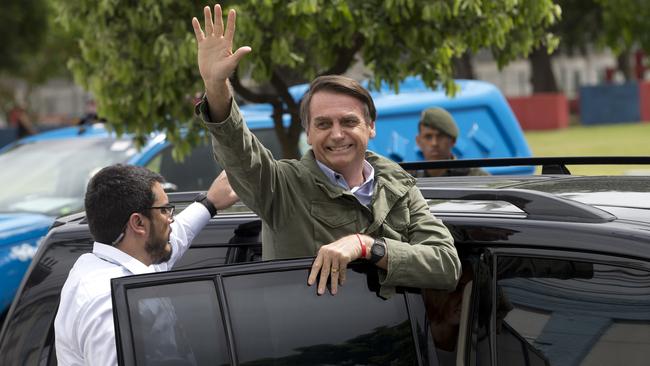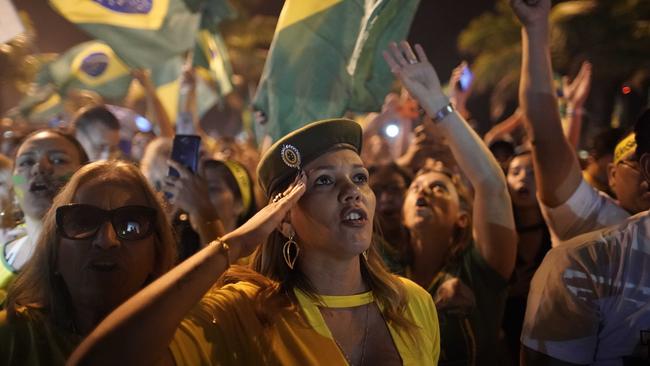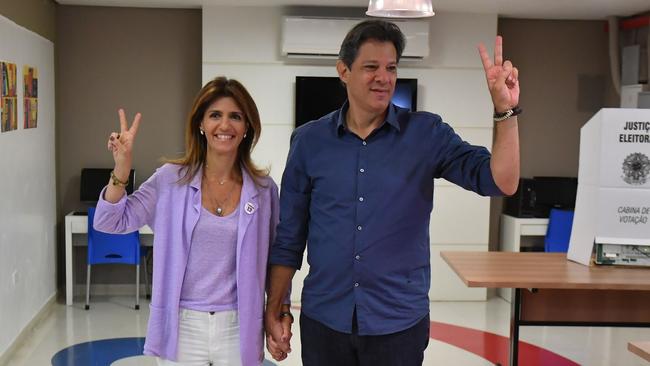Victory of Brazil right-winger Jair Bolsonaro latest shock in global politics
The rise of Brazil’s new firebrand president is the latest shock in global politics and shifts the country sharply to the right.

For years Jair Bolsonaro was a bizarre sideshow in Brazilian politics — an outlandish ex-army captain who waxed nostalgic about the dictatorship he served and only got one bill enacted in nearly three decades as a congressman.
Now, the 63-year-old has won Brazil’s presidency, after taking 55.4 percent of the votes, 11 percentage points ahead of his nearest rival, leftist Fernando Haddad of the Workers’ Party, who had 44.4 percent of the vote.
The rise of the right-wing firebrand is the latest shock in global politics as voters turn against the status quo, starting in 2016 with the Brexit vote in the UK and Donald Trump’s election in the US It also likely shifts politics in the world’s fourth largest democracy sharply to the right.

The anger among voters in Latin America crosses party ideology. Voters in Mexico in July elected leftist nationalist Andrés Manuel López Obrador largely for the same reasons the right-wing Mr Bolsonaro did well in Brazil: They are fed up with corruption and rising crime.
Political scientists point to Mr Bolsonaro’s victory as the “coming out” of Brazil’s growing right-wing movement. Since the end of military rule in 1985, “conservative” has been a dirty word here, absent from the names of all Brazil’s 35 political parties.
But a flurry of corruption allegations against the leftist Workers’ Party, which ruled here from 2003 to 2016, and the recent implosion of the socialist regime in neighboring Venezuela have emboldened Brazil’s right. So has a growing number of evangelical Christians.
“Brazilians are now openly expressing conservative views, on social media, at home, in their workplaces…it’s an extraordinary change that has happened in a relatively short period of time,” said Bruno Garschagen, one of a generation of new conservative authors filling bookshelves and blogs.
The revolt in Brazil didn’t stop at the presidential palace. In the first round of voting, Mr Bolsonaro’s conservative PSL party won 52 seats in the lower house of Congress, transforming it into the second-biggest political party in Brazil’s next government. Meanwhile, the traditional titans of Brazilian politics that have largely ruled the country since it returned to democracy in 1985 suffered a string of humiliating defeats.

While the leftist Workers’ Party managed to stay in the presidential race, it lost key seats around the country and even failed to elect former President Dilma Rousseff as a senator. Brazil’s other political behemoth, the centrist PSDB party, also suffered crushing defeats, with its presidential candidate Geraldo Alckmin getting just 4.8% of the vote.
Over the past five years, Brazil has suffered its deepest recession in its history, alongside a corruption scandal that implicated every major political party. That allowed Mr Bolsonaro, who hasn’t been caught in a corruption scandal in his long political career, to promote himself as the only option for change.
Yet Mr. Bolsonaro’s rapid ascent came as a shock to Brazilian pollsters, analysts, columnists and many politicians themselves. Less than two weeks before the first round of voting, pollster Datafolha put Mr Bolsonaro’s support at just 28%.
Many analysts here long argued that Mr Bolsonaro could never win the presidency, partly because of his derogatory comments against gay people, women and minorities. But his antiestablishment stance appealed to voters.
“It was always ridiculous to think that Brazil, the Western democracy that has probably suffered most in recent years from recession, crime and scandal, was going to buck this global trend and elect an establishment figure,” said Brian Winter, vice president for policy at New York-based Americas Society/Council of the Americas.
Many Brazilians who voted for Mr Bolsonaro said it was the only way to defeat Mr Haddad, who was picked last month to replace former President Luiz Inácio Lula da Silva, the popular party founder who is in jail for corruption.
Many Brazilians were so disgusted with the choices that 40 million people refused to pick any candidate at all, either casting blank votes or abstaining, some flouting the country’s compulsory voting rules.
Mr Bolsonaro campaigned on nostalgia for the country’s 21-year long military dictatorship that ended with the return to democracy in 1985.
The former army captain has vowed to better equip police, lower the age of criminal responsibility to 16 from 18, and loosen gun laws to tackle high crime. Brazil has the world’s highest tally of annual murders, some 175 killings a day. He has also said police should shoot to kill more often, stirring concerns among some voters.
“I’m afraid Bolsonaro would open the door to censorship, intolerance, to a reign of fear,” said Thiago de Figueiredo, a 23-year-old college student.
Mr Bolsonaro’s victory was the culmination of deep shifts in Brazilian society over recent decades, including the rise of evangelical Christianity. Mr Bolsonaro himself is a devout Christian baptised in the Jordan River. His middle name in Portuguese is “Messiah.”
Now comprising a third of Brazilians, evangelicals are on track to outnumber Catholics by 2035, according to pollster Datafolha. Bishop Edir Macedo, the billionaire founder of one of Brazil’s biggest evangelical churches who also owns the powerful TV Record network, endorsed Mr Bolsonaro shortly before the vote.
Before the results were known, but with much of the country now behind him, Mr. Bolsonaro said in a radio interview recently that he saw no reason to change or moderate his message. “I’m not going to become the little ‘peace and love’ Jair.”
The Wall St Journal



